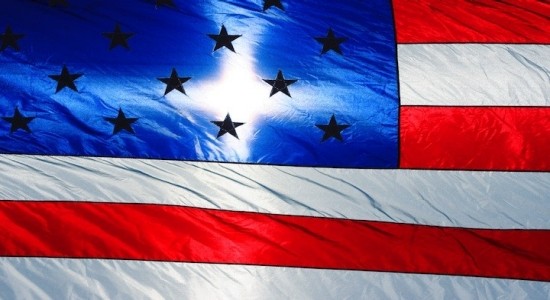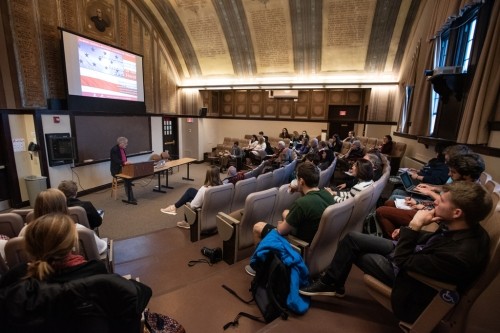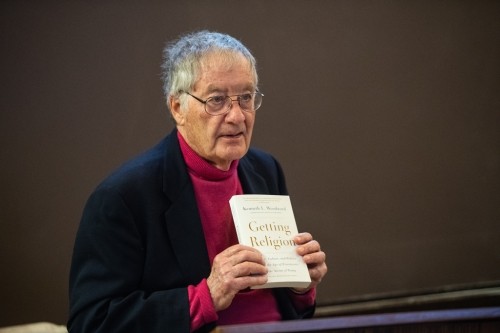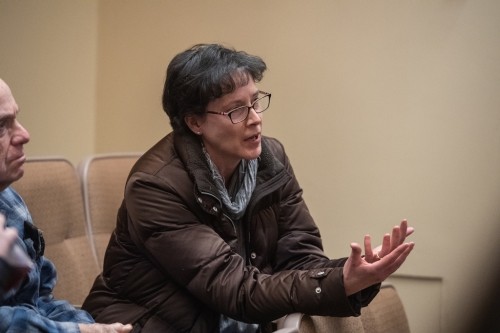Religion in the White House

Second Annual Wolfe Lecture on Religion and American Politics
Kenneth L. Woodward
Former Religion Editor, Newsweek
Date: March 14, 2019
Abstract
This lecture argues that most of the ways we think about the relationships between religion and politics are wrong. First, Woodward will argue that no connection can be found between any American president’s religious faith, or lack of it, and his foreign or domestic policy. Woodward will illustrate his argument by examining several recent presidents who were mistakenly thought to be basing at least some policies on their religious convictions. The second part of this lecture examines the so-called “religious vote.” Woodward will pay particularly close attention to the Evangelical vote in the 2016 election, and offers all the reasons, other than religion, why Trump won that vote.
Speaker Bio

Kenneth L. Woodward was the Religion Editor of Newsweek for thirty eight years. Over the course of his distinguished career he has written more than 1,200 articles, essays, and reviews for a variety of publications, including seventy cover stories for Newsweek. He is the author of four books, which have been translated into nine languages. His most recent, on which this lecture is partially based, is Getting Religion: Faith, Culture, and Politics from the Age of Eisenhower to the Ascent of Trump.
Event Photos

Kenneth L. Woodward delivers the Second Annual Wolfe Lecture on Religion and American Politics, entitled, "Religion in the White House."

Woodward displays the book, Getting Religion: Faith, Culture, and Politics from the Age of Eisenhower to the Ascent of Trump (Convergent, 2017), on which his remarks were partially based.

Photos by MTS Photography
Event Recap
What is the relationship, if any, between a president’s religious beliefs and policies? On Thursday, March 14th, the Boisi Center welcomed Kenneth L. Woodward, former religion editor for Newsweek, to Boston College to address this question in the 2nd Annual Wolfe Lecture on Religion and American Politics on “Religion in the White House.” Woodward argued that a president’s personal religious convictions have little influence over foreign or domestic policies; rather, religion has often been used as a justification for political decisions.
Woodward opened by discussing prevalent misunderstandings embedded in the stories we tell ourselves regarding national and religious identities. While there is widespread belief that the thirteen original colonies were predominantly devout Christian communities, Woodward argued that, at best, the colonists practiced a “baptized heathenism,” with only small percent of institutionally religious. Woodward pressed that religion in the colonial and revolutionary periods served a primarily social function in that it molded the conscience of citizens and provided a framework for the social order. In other words, religion wasn’t practiced as a good in itself; it was instrumentalized as a useful foundation for the social order.
Woodward went on to tie this instrumentalization of religion to the U.S. presidency. Woodward pressed that the president’s personal religion has, primarily, been used as a tool of persuasion for already-calculated political decisions, having little causal impact on political policies themselves. Woodward offered a few examples, including President William McKinley and his dealings with the Philippines. After the Spanish were defeated and lost control of the Philippines, Mckinley had military, geographic, and political reasons to ensure the Philippines never came under the control of any other foreign entity. To justify his invasion of the Philippines, McKinley instrumentalized religion by claiming that it was essential to "christianize" the Filipino people, disregarding that the Philippines had been a Catholic country for over three hundred years.
Towards the end of his lecture, Woodward discussed the presidential election of 2016 and its ties to religion, especially evangelicals. Many have argued that since four out of five evangelical Christians voted for Trump, religion was a key factor in the last election. According to Woodward, this is a mistake, as exit polls only provide the profile of voters and their choices, not the reasons why they voted for that candidate. Woodward, instead, contends that evangelicals voted for Trump in the last election for two reasons, neither of which have to do directly with their religion. First, a deep dislike and a distrust in Hillary Clinton. Second, economic hardship and anxieties about the future; many Evangelicals have an income of less than $30,000 a year, and have seen little wage increase since the 1980’s.
The Q&A session was dedicated to the future of the Republican party, the role of national religious figures, such as Billy Graham, and their relationships to the president, and the role of religion in the lives of young adults today.
Read More
Books
Balmer, Randall Herbert. God in the White House: A History: How Faith Shaped the Presidency from John F. Kennedy to George W. Bush. 1st ed. New York: HarperOne, 2008.
Bowman, Matthew Burton. Christian: the Politics of a Word in America. Cambridge: Harvard University Press, 2018.
Dulk, Kevin R. den and Elizabeth Anne Oldmixon, ed. Mediating Religion and Government: Political Institutions and the Policy Process. 1st ed. New York: Palgrave Macmillan, 2014.
Margolis, Michel F. From Politics to the Pews: How Partisanship and the Political Environment Shape Religious Identity. Chicago: The University of Chicago Press, 2018.
McDougall, Walter A. The Tragedy of U.S. Foreign Policy: How America’s Civil Religion Betrayed the National Interest. New Haven: Yale University Press, 2016.
Woodward, Kenneth L. Getting Religion: Faith, Culture and Politics from the Age of Eisenhower to the Ascent of Trump. New York: Convergent Books, 2017.
Articles
Alvarado, Emmanuel and Thomas C. Wilson, advisor. “Beyond Culture Wars: The role of Christian Religiosity in the Public Support for Social Safety Net Policies in Contemporary America.” PhD diss., Florida Atlantic University, 2010.
Carmy, Shalom. “Personal Ethics, Public Virtue, and Political Legitimacy in Biblical Kings and American Presidents.” Presidential Studies Quarterly 40, no.1 (March 2010): 76-89. DOI: 10.1111/j.1741-5705.2009.03734.x
Domke, David, Anthony Greenwald and Penelope Sheets. “God and Country: The Partisan Psychology of the Presidency, Religion, and Nation.” Political Psychology 32, no. 3 (2011): 459-484. DOI: 10.1111/j.1467-9221.2010.00820.x
Jung, Cindy. “The Trump Exception: Christian Morals and the Presidency ( U.S. Election).” Harvard International Review 37, no. 4, (Summer 2016): 7-9.
Other
God in America. http://www.pbs.org/godinamerica/view/
In the News
In an article from May of last year, Kelsey Dallas, the faith editor for Deseret News InDepth, interviewed Kenneth Woodward about his time as Newsweek’s religion editor during a time of enormous social change and today’s religion crisis. Woodward argues that religion is disappearing from today’s public life and notes the absence of “national religious heroes”.

